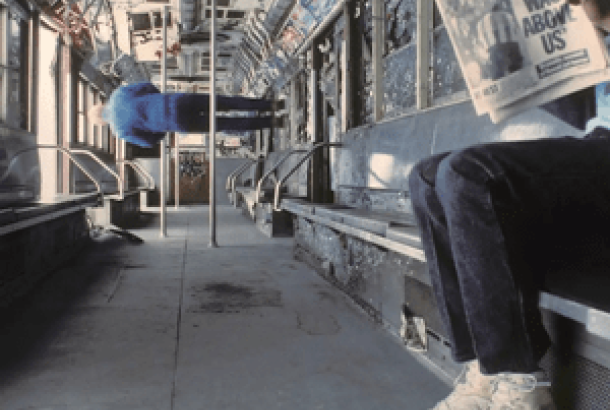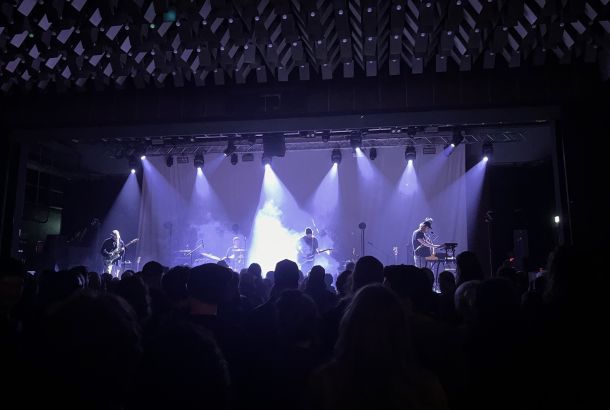8th November 2018
Performing Rights Society for Music Foundation: fighting the good fight
By elliscoopey
Contributor Ellis Coopey sheds light on the important but slow work PRS are doing for female musicians in the current industry
Categories: Music

Photo: Graham Crumb @Wikimedia Commons
If you’ve been anywhere that plays music publicly (live or piped through speakers) then you’ve probably seen that red sticker on the doors or windows, with the letters ‘PRS’ in white. Well, PRS stands for Performing Rights Society. Essentially what this means is that the venue is supporting the growth of artists, protecting their rights (copyright, royalties, etc.) and licensing the use of their members’ music. Pretty cool right?
This means the bar you’re in, and I’m paraphrasing, submits a playlist to PRS, registering a list of tracks they desire to play within the establishment and then are charged a fee. On PRS’s end, this is distributed to the musicians as royalties and a slice is also put into a pot to support artists who need additional financial support to get their projects off the ground. This separate pot is a charity called ‘PRS for Music Foundation’ and these guys are doing some pretty amazing things.
The charity is leading the charge in the UK on the gender imbalance issue running rife in the music industries. This is no mean feat. PRS are in a fortunate position in that their financial support is at the centre of so much music-making nationwide. This means that they’re able to collect statistics about who exactly is doing the music-making in the UK, according to their books, and put in place strategies to address issues that arise.
For example, when in 2011 they noted that only 13% of PRS for Music members were women and 16% of applications for commissions received by PRS Foundation featured female composers and songwriters, they launched their ‘Women Make Music’ initiative. The aim is to ‘Raise awareness of the gender gap amongst songwriters and composers; encourage more female music creators to come forward for funding and increase the profile of women who are creating new music in the UK and support role models for future generations’.
Has it helped? In 2016, PRS for Music Foundation released a 5-year report on the scheme, here’s what they found. In the first year of running, Women Make Music, 86% of applicants had not applied before, demonstrating the increased reach of targeted initiatives. The demand was high, and they were only able to support 12% of the 1,300 applications received and 38% were not PRS for Music Members. This is suggesting that women are less likely to register as professional songwriters than their male counterparts (16% of the UK’s registered songwriters and composers are women) and for those reporting on business development, seed funding from Women Make Music generated 100% return on investment and a 27% increase in overall income.
The proof is in the pudding, don’t you think?
CEO Vanessa Reed stands by this initiative and claims: ”At the foundation we are setting ourselves the target achieving a 50-50 balance of male-female music creator applicants by 2022.
“This report calls on government, fellow funding agencies and other industry partners to work with us on this goal by endorsing and investing in good practice, and positive action, like our ‘Women Make Music’ fund, promoting role models for the next generation and improving working conditions for women in music. Only then can we be sure that a broader range of talent will be empowered to develop a career in writing music and that the music industry will better reflect the world around us.”
There are obviously still problems – let’s not pretend there isn’t. History has a lot to answer for, but perhaps we should take a moment to recognise those taking positive action to turn these things around. Personally, I hope this kind of positive action is one day, a consideration of the past.
I’d like to be able to tell stories around the fire to my grandchildren about fighting the good fight. “Come on Grandad, that didn’t really happen,” they’d refute, and perhaps their generation will be fighting for the rights of Artificial Intelligence instead, and I’ll have strong-minded opinions about ‘the way things used to be’. In the words of Kaija Saarioho, who in 2016, was the second female composer to ever have an opera mounted at the New York Met, “It just shows how slowly these things evolve, but they are evolving – in all fields and also in music.”
PRS for Music Foundations’ Women Make Music 5-year report can be found on the PRS website.
More Coverage
Northern Music Awards 2024: Celebrating breakthrough acts, chart-topping superstars, and the people behind the scenes
Celebrating northern music in all of its charm, Nordoff and Robbins host the 2024 Northern Music Awards in Manchester’s city centre
Vampire Weekend: Indie experimenters push the boundaries on exceptional new release
Vampire Weekend continue to cement a legacy and New York indie royalty with their newest offering, ‘Only God Was Above Us’
DIIV live in Manchester: Shoegaze stars promise enlightenment
Misspelt shoegazers DIIV took to New Century Hall, with special guests in Hull’s bdrmm
Khruangbin’s LP, A LA SALA: Slight shifts make all the difference
Texan three-piece instrumentalists Khruangbin return with their newest LP, A LA SALA, demonstrating that a band can grow with the most subtle of changes







